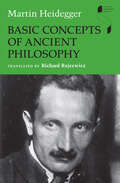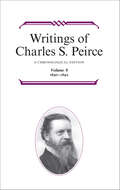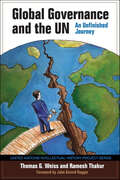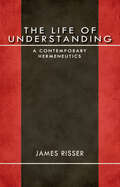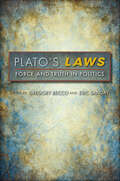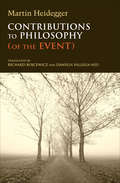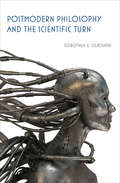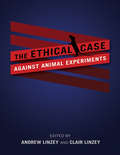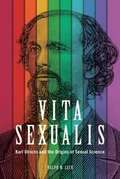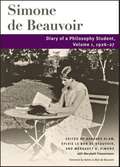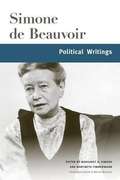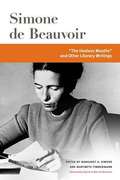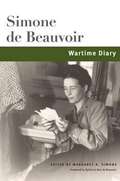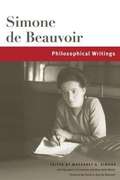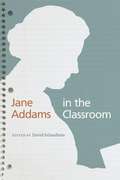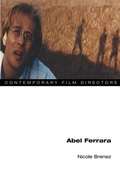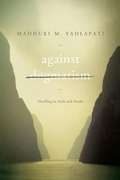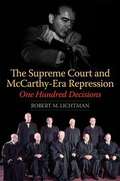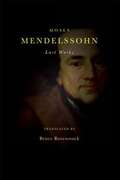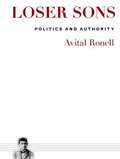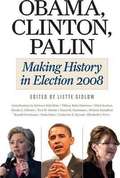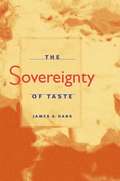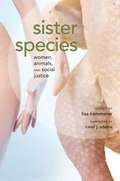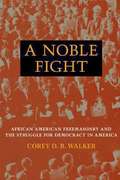- Table View
- List View
Basic Concepts of Ancient Philosophy (Studies in Continental Thought)
by Martin Heidegger Richard RojcewiczBasic Concepts of Ancient Philosophy presents a lecture course given by Martin Heidegger in 1926 at the University of Marburg. First published in German as volume 22 of the collected works, the book provides Heidegger's most systematic history of Ancient philosophy beginning with Thales and ending with Aristotle. In this lecture, which coincides with the completion of his most important work, Being and Time, Heidegger is working out a way to sharply differentiate between beings and Being. Richard Rojcewicz's clear and accurate translation offers English-speaking readers valuable insight into Heidegger's views on Ancient thought and concepts such as principle, cause, nature, unity, multiplicity, Logos, truth, science, soul, category, and motion.
Writings of Charles S. Peirce: A Chronological Edition (Writings of Charles S. Peirce)
by Charles S. PeirceVolume 8 of this landmark edition follows Peirce from May 1890 through July 1892—a period of turmoil as his career unraveled at the U.S. Coast and Geodetic Survey. The loss of his principal source of income meant the beginning of permanent penury and a lifelong struggle to find gainful employment. His key achievement during these years is his celebrated Monist metaphysical project, which consists of five classic articles on evolutionary cosmology. Also included are reviews and essays from The Nation in which Peirce critiques Paul Carus, William James, Auguste Comte, Cesare Lombroso, and Karl Pearson, and takes part in a famous dispute between Francis E. Abbot and Josiah Royce. Peirce's short philosophical essays, studies in non-Euclidean geometry and number theory, and his only known experiment in prose fiction complete his production during these years.Peirce's 1883-1909 contributions to the Century Dictionary form the content of volume 7 which is forthcoming.
Global Governance and the UN: An Unfinished Journey (United Nations Intellectual History Project Series)
by Thomas G. Weiss Ramesh ThakurIn the 21st century, the world is faced with threats of global scale that cannot be confronted without collective action. Although global government as such does not exist, formal and informal institutions, practices, and initiatives—together forming "global governance"—bring a greater measure of predictability, stability, and order to trans-border issues than might be expected. Yet, there are significant gaps between many current global problems and available solutions. Thomas G. Weiss and Ramesh Thakur analyze the UN's role in addressing such knowledge, normative, policy, institutional, and compliance lapses. The UN's relationship to these five global governance gaps is explored through case studies of some of the most burning problems of our age, including terrorism, nuclear proliferation, humanitarian crises, development aid, climate change, human rights, and HIV/AIDS.
The Life of Understanding: A Contemporary Hermeneutics (Studies In Continental Thought Ser.)
by James RisserIn Gadamer's hermeneutics, interpretation is inseparable from the broader concern of making one's way in life. In this book, James Risser builds on this insight about the juxtaposition of human living and the act of understanding by tracing hermeneutics back to the basic experience of philosophy as defined by Plato. For Risser, Plato provides resources for new directions in hermeneutics and new possibilities for "the life of understanding" and "the understanding of life." Risser places Gadamer in dialogue with Plato, with the issue of memory as a conceptual focus. He develops themes pertaining to hermeneutics such as retrieval as a matter of convalescence, exile as a venture into the foreign, formation with respect to oneself and to life with others, the experience of language in hermeneutics, and the relationship between speaking and writing.
Plato's Laws: Force and Truth in Politics (Studies in Continental Thought)
by Gregory Recco and Eric SandayReaders of Plato have often neglected the Laws because of its length and density. In this set of interpretive essays, notable scholars of the Laws from the fields of classics, history, philosophy, and political science offer a collective close reading of the dialogue "book by book" and reflect on the work as a whole. In their introduction, editors Gregory Recco and Eric Sanday explore the connections among the essays and the dramatic and productive exchanges between the contributors. This volume fills a major gap in studies on Plato's dialogues by addressing the cultural and historical context of the Laws and highlighting their importance to contemporary scholarship.
Contributions to Philosophy: (Of the Event) (Studies in Continental Thought)
by Martin HeideggerHeidegger&’s second magnum opus after Being and Time, laying the groundwork for his later writing, in a translation of &“impeccable clarity and readability&” (Peter Warnek). Martin Heidegger&’s Contributions to Philosophy, written in the late 1930s and published posthumously in 1989, is now widely viewed as his second magnum opus, after Being and Time. Here, Heidegger lays the groundwork for a new conception of thought and being, rooting them both in the event of appropriation. Here, Heidegger establishes the language and intellectual framework necessary for all of his later writings. Contributions was composed as a series of private ponderings that were not originally intended for publication. They are nonlinear and radically at odds with the traditional understanding of thinking. This translation presents Heidegger in plain and straightforward terms, allowing surer access to this new turn in Heidegger&’s conception of being.
Postmodern Philosophy and the Scientific Turn
by Dorothea E. OlkowskiA groundbreaking, interdisciplinary approach to the study of consciousness: &“Beautifully written, engaging throughout, and captivating&” (Claire Colebrook, The Pennsylvania State University). What can come of a scientific engagement with postmodern philosophy? Some scientists have claimed that the social sciences and humanities have nothing to contribute, except perhaps peripherally, to their research. Dorothea E. Olkowski shows that mathematics itself—the historic link between science and philosophy—plays a fundamental role in the development of the worldviews that drive both fields. Focusing on language, its usage and expression of worldview, she develops a phenomenological account of human thought and action to explicate the role of philosophy in the sciences. Olkowski proposes a model of phenomenology, both scientific and philosophical, that helps make sense of reality and composes an ethics for dealing with unpredictability in our world.
Thinking through French Philosophy: The Being of the Question
by Leonard Lawlor"... no other book undertakes to relate all these French philosophers to each other the way that [Lawlor] does, brilliantly." --François RaffoulFor many, Jacques Derrida, Michel Foucault, and Gilles Deleuze represent one of the greatest movements in French philosophy. But these philosophers and their works did not materialize without a philosophical heritage. In Thinking through French Philosophy, Leonard Lawlor shows how the work of Maurice Merleau-Ponty formed an important current in sustaining the development of structuralism and post-structuralism. Seeking the "point of diffraction," or the specific ideas and concepts that link Derrida, Foucault, and Deleuze, Lawlor discovers differences and convergences in these thinkers who worked the same terrain. Major themes include metaphysics, archaeology, language and documentation, expression and interrogation, and the very experience of thinking. Lawlor's focus on the experience of the question brings out critical differences in immanence and transcendence. This illuminating and provocative book brings new vitality to debates on contemporary French philosophy.
The Ethical Case against Animal Experiments
by Andrew Linzey Clair LinzeyAt present, human beings worldwide are using an estimated 115.3 million animals in experiments ”a normalization of the unthinkable on an immense scale. In terms of harm, pain, suffering, and death, animal experiments constitute one of the major moral issues of our time. Given today's deeper understanding of animal sentience, we must afford animals a special moral consideration that precludes their use in experiments. The Ethical Case against Animal Experiments begins with a groundbreaking and comprehensive ethical critique of the practice of animal experiments by the Oxford Centre for Animal Ethics. A second section offers original writings that engage with, and elaborate on, aspects of the Oxford Centre report. The essayists explore historical, philosophical, and personal perspectives that range from animal experiments in classical times to the place of necessity in animal research to one researcher's painful journey from researcher to opponent. A devastating look at a contemporary moral crisis, The Ethical Case against Animal Experiments melds logic to compassion to mount a powerful challenge to human cruelty.
Vita Sexualis: Karl Ulrichs and the Origins of Sexual Science
by Ralph M. LeckKarl Ulrichs's studies of sexual diversity galvanized the burgeoning field of sexual science in the nineteenth century. But in the years since, his groundbreaking activism has overshadowed his scholarly achievements. Ulrichs publicly defied Prussian law to agitate for gay equality and marriage, and founded the world's first organization dedicated to the legal and social emancipation of homosexuals. Ralph M. Leck returns Ulrichs to his place as the inventor of the science of sexual heterogeneity. Leck's analysis situates sexual science in a context that includes politics, aesthetics, the languages of science, and the ethics of gender. Although he was the greatest nineteenth-century scholar of sexual heterogeneity, Ulrichs retained certain traditional conjectures about gender. Leck recognizes these subtleties and employs the analytical concepts of modernist vita sexualis and traditional psychopathia sexualis to articulate philosophical and cultural differences among sexologists. Original and audacious, Vita Sexualis uses a bedrock figure's scientific and political innovations to open new insights into the history of sexual science, legal systems, and Western amatory codes.
Diary of a Philosophy Student: Volume 1, 1926-27
by Simone De Beauvoir Sylvie Le Beauvoir Margaret A. Simons Marybeth Timmermann Barbara KlawRevelatory insights into the early life and thought of the preeminent French feminist philosopher Dating from her years as a philosophy student at the Sorbonne, this is the 1926-27 diary of the teenager who would become the famous French philosopher, author, and feminist, Simone de Beauvoir. Written years before her first meeting with Jean-Paul Sartre, these diaries reveal previously unknown details about her life and offer critical insights into her early philosophy and literary works. Presented here for the first time in translation and fully annotated, the diary is completed by essays from Barbara Klaw and Margaret A. Simons that address its philosophical, historical and literary significance. The volume represents an invaluable resource for tracing the development of Beauvoir's independent thinking and influence on the world.
Political Writings
by Simone De Beauvoir Sylvie Le Beauvoir Margaret A. Simons Marybeth TimmermannPolitical Writings offers an abundance of newly translated essays by Simone de Beauvoir that demonstrate a heretofore unknown side of her political philosophy. The volume traces nearly three decades of Beauvoir's leftist political engagement, from exposés of conditions in fascist Spain and Portugal in 1945 and hard-hitting attacks on right-wing French intellectuals in the 1950s, to the 1962 defense of an Algerian freedom fighter Djamila Boupacha and a 1975 article arguing for what is now called the "two-state solution" in Israel. In addition, this collection includes provocative essays in which Beauvoir analyzes American politics in ways of particular interest to scholars today.
"The Useless Mouths" and Other Literary Writings
by Simone De Beauvoir Sylvie Le Beauvoir Margaret A. Simons Marybeth Timmermann"The Useless Mouths" and Other Literary Writings brings to English-language readers literary writings--several previously unknown--by Simone de Beauvoir. Culled from sources including various American university collections, the works span decades of Beauvoir's career. Ranging from dramatic works and literary theory to radio broadcasts, they collectively reveal fresh insights into Beauvoir's writing process, personal life, and the honing of her philosophy. The volume begins with a new translation of the 1945 play "The Useless Mouths," written in Paris during the Nazi occupation. Other pieces were discovered after Beauvoir's death in 1986, such as the 1965 short novel Misunderstanding in Moscow, involving an elderly French couple who confront their fears of aging. Two additional previously unknown texts include the fragmentary "Notes for a Novel," which contains the seed of what she later would call "the problem of the Other," and a lecture on postwar French theater titled "Existential Theater." The collection notably includes the eagerly awaited translation of Beauvoir's contribution to a 1965 debate among Jean-Paul Sartre and other French writers and intellectuals, "What Can Literature Do?" Prefaces to well-known works such as Bluebeard and Other Fairy Tales,La Bâtarde, and James Joyce in Paris: His Final Years are also available in English for the first time, alongside essays and other short articles. A landmark contribution to Beauvoir studies and French literary studies, the volume includes informative and engaging introductory essays by prominent and rising scholars. Contributors are Meryl Altman, Elizabeth Fallaize, Alison S. Fell, Sarah Gendron, Dennis A. Gilbert, Laura Hengehold, Eleanore Holveck, Terry Keefe, J. Debbie Mann, Frederick M. Morrison, Catherine Naji, Justine Sarrot, Liz Stanley, Ursula Tidd, and Veronique Zaytzeff.
Wartime Diary (The Beauvoir Series)
by Simone De Beauvoir Sylvie Le Beauvoir Margaret A. Simons Anne Deing CorderoWritten from September 1939 to January 1941, Simone de Beauvoir’s Wartime Diary gives English readers unabridged access to one of the scandalous texts that threaten to overturn traditional views of Beauvoir’s life and work. Beauvoir’s account of her clandestine affair with Jacques Bost and sexual relationships with various young women challenges the conventional picture of Beauvoir as the devoted companion of Jean-Paul Sartre, just as her account of completing her novel She Came to Stay at a time when Sartre’s philosophy in Being and Nothingness was barely begun calls into question the traditional view of Beauvoir’s novel as merely illustrating Sartre’s philosophy. Most important, the Wartime Diary provides an exciting account of Beauvoir’s philosophical transformation from the prewar solipsism of She Came to Stay to the postwar political engagement of The Second Sex. This edition also features previously unpublished material, including her musings about consciousness and order, recommended reading lists, and notes on labor unions. In providing new insights into Beauvoir’s philosophical development, the Wartime Diary promises to rewrite a crucial chapter of Western philosophy and intellectual history.
Philosophical Writings
by Simone De Beauvoir Margaret SimonsDating from her years as a philosophy student at the Sorbonne, this is the 1926-27 diary of the teenager who would become the famous French philosopher, author, and feminist, Simone de Beauvoir. Written years before her first meeting with Jean-Paul Sartre, these diaries reveal previously unknown details about her life and offer critical insights into her early philosophy and literary works. Presented here for the first time in translation and fully annotated, the diary is completed by essays from Barbara Klaw and Margaret A. Simons that address its philosophical, historical, and literary significance. The volume represents an invaluable resource for tracing the development of Beauvoir's independent thinking and influence on the world.
Jane Addams in the Classroom
by David SchaafsmaOnce intent on being good to people, Jane Addams later dedicated herself to the idea of being good with people, establishing mutually-responsive and reciprocal relationships with those she served at Hull House. The essays in Jane Addams in the Classroom explore how Addams's life, work, and philosophy provide invaluable lessons for teachers seeking connection with their students. Balancing theoretical and practical considerations, the collection examines Addams's emphasis on listening to and learning from those around her and encourages contemporary educators to connect with students through innovative projects and teaching methods. In the first essays, Addams scholars lay out how her narratives drew on experience, history, and story to explicate theories she intended as guides to practice. Six teacher-scholars then establish Addams's ongoing relevance by connecting her principles to exciting events in their own classrooms. An examination of the Jane Addams Children's Book Award and a fictional essay on Addams's work and ideas round out the volume. Accessible and wide-ranging, Jane Addams in the Classroom offers inspiration for educators while adding to the ongoing reconsideration of Addams's contributions to American thought.
Abel Ferrara (Contemporary Film Directors)
by Nicole Brenez Adrian MartinIn this concise study, Nicole Brenez argues for Abel Ferrara's place in a line of grand inventors who have blurred distinctions between industry and avant-garde film, including Orson Welles, Monte Hellman, and Nicholas Ray. Rather than merely reworking genre film, Brenez understands Ferrara's oeuvre as formulating new archetypes that depict the evil of the modern world. Focusing as much on the human figure as on elements of storytelling, she argues that films such as Bad Lieutenant express this evil through visionary characters struggling against the inadmissible (inadmissible behavior, morality, images, and narratives).
Against Dogmatism: Dwelling in Faith and Doubt
by Madhuri M. YadlapatiMany contemporary discussions of religion take an absolute, intractable approach to belief and non-belief, which privileges faith and dogmatism while treating doubt as a threat to religious values. As Madhuri M. Yadlapati demonstrates, however, there is another way: a faith (or non-faith) that embraces doubt and its potential for exploring both the depths and heights of spiritual reflection and speculation. Through three distinct discussions of faith, doubt, and hope, Yadlapati explores what it means to live creatively and responsibly in the everyday world as limited, imaginative, and questioning creatures. She begins with a perceptive survey of diverse faith experiences in Islam, Buddhism, Judaism, Hinduism, and Protestant Christianity, then narrows her focus to Protestant Christianity and Hinduism to explore how the great thinkers of those faiths have embraced doubt in the service of spiritual transcendence. Defending the rich tapestry of faith and doubt against polarization, Against Dogmatism reveals a spiritual middle way, an approach native to the long-standing traditions in which faith and doubt are interwoven in constructive and dynamic ways.
The Supreme Court and McCarthy-Era Repression: One Hundred Decisions
by Robert M. LichtmanThe 1950s "Red Scare" marks one of the stormiest periods in U.S. Supreme Court history. Robert M. Lichtman provides the definitive history of the high court's decisions in every one of the "Communist" cases it decided, placing each within the context of the time and revealing the broad range and impact of McCarthy-era repression. Making extensive use of the justices' papers, Lichtman examines the dynamics of the Court's changes in direction, from the Vinson Court's rubber-stamping of government action against subversives to the Warren Court's more liberal rulings and the subsequent retreat led by Felix Frankfurter. Lichtman's account details the Court's surprising vulnerability to popular and political attack and reveals the behind-the-scenes relationships and rivalries among justices. At the same time, he recounts in devastating detail the injuries inflicted by McCarthyism on individuals and the nation.
Last Works
by Moses Mendelssohn Bruce RosenstockMoses Mendelssohn (1729-1786) was the central figure in the emancipation of European Jewry. His intellect, judgment, and tact won the admiration and friendship of contemporaries as illustrious as Johann Gottfried Herder, Gotthold Ephraim Lessing, and Immanuel Kant. His enormously influential Jerusalem (1783) made the case for religious tolerance, a cause he worked for all his life. Last Works includes, for the first time complete and in a single volume, the English translation of Morning Hours: Lectures on the Existence of God (1785) and To the Friends of Lessing (1786). Bruce Rosenstock has also provided an historical introduction and an extensive philosophical commentary to both texts. At the center of Mendelssohn's last works is his friendship with Lessing. Mendelssohn hoped to show that he, a Torah-observant Jew, and Lessing, Germany's leading dramatist, had forged a life-long friendship that held out the promise of a tolerant and enlightened culture in which religious strife would be a thing of the past. Lessing's death in 1781 was a severe blow to Mendelssohn. Mendelssohn wrote his last two works to commemorate Lessing and to carry on the work to which they had dedicated much of their lives. Morning Hours treats a range of major philosophical topics: the nature of truth, the foundations of human knowledge, the basis of our moral and aesthetic powers of judgment, the reality of the external world, and the grounds for a rational faith in a providential deity. It is also a key text for Mendelssohn's readings of Spinoza. In To the Friends of Lessing, Mendelssohn attempts to unmask the individual whom he believes to be the real enemy of the enlightened state: the Schwärmer, the religious fanatic who rejects reason in favor of belief in suprarational revelation.
Loser Sons: Politics and Authority
by Avital RonellThere are sons who grow up unhappily believing that no matter what they do, they cannot please their fathers. Often unable to shed their sense of lifelong failure, either they give up and suffer in a permanent sulk, or they try with all their might to prove they are worth something after all. These are the "loser sons," a group of historical men as varied as President George W. Bush, Osama bin Laden, and Mohammed Atta. Their names quickly illustrate that not only are their problems serious, but they also make serious problems for others, expanding to whole nations. When God is conceived and inculcated as an angry and impossible-to-please father, the problems can last for generations. In Loser Sons, Avital Ronell draws on current philosophy, literary history, and political events to confront the grim fact that divested boys become terrifying men. This would be old news if the problem didn't recur so often with such disastrous consequences. Looking beyond our current moment, she interrogates the problems of authority, paternal fantasy, and childhood as they have been explored and exemplified by Franz Kafka, Goethe's Faust, Benjamin Franklin, Jean-François Lyotard, Hannah Arendt, Alexandre Kojève, and Immanuel Kant. Brilliantly weaving these threads into a polyvocal discourse, Ronell shows how, with their arrays of powerful symbols, ideologies of all sorts perpetuate the theme that while childhood represents innocence, adulthood entails responsible cruelty. The need for suffering--preferably somebody else's--has become a widespread assumption, not only justifying abuses of authority, but justifying authority itself. Shockingly honest, Loser Sons recognizes that focusing on the spectacular catastrophes of modernity might make writer and reader feel they're engaged in something important, while in fact what they are engaged in is still only spectacle. To understand the implications of her insights, Ronell addresses them directly to her readers, challenging them to think through their own notions of authority and their responses to it.
Obama, Clinton, Palin: Making History in Elections 2008
by Liette GidlowElection 2008 made American history, but it was also the product of American history. Barack Obama, Hillary Clinton, and Sarah Palin smashed through some of the most enduring barriers to high political office, but their exceptional candidacies did not come out of nowhere. In these timely and accessible essays, a distinguished group of historians explores how the candidates both challenged and reinforced historic stereotypes of race and sex while echoing familiar themes in American politics and exploiting new digital technologies. Contributors include Kathryn Kish Sklar on Clinton's gender masquerade; Tiffany Ruby Patterson on the politics of black anger; Mitch Kachun on Michelle Obama and stereotypes about black women's bodies; Glenda E. Gilmore on black women's century of effort to expand political opportunities for African Americans; Tera W. Hunter on the lost legacy of Shirley Chisholm; Susan M. Hartmann on why the U.S. has not yet followed western democracies in electing a female head of state; Melanie Gustafson on Palin and the political traditions of the American West; Ronald Formisano on the populist resurgence in 2008; Paula Baker on how digital technologies threaten the secret ballot; Catherine E. Rymph on Palin's distinctive brand of political feminism; and Elisabeth I. Perry on the new look of American leadership.
The Sovereignty of Taste
by James S. HansChallenging prevailing trends toward aesthetic neutrality, James S. Hans argues that there is such a thing as good and bad taste, that taste is something one is born with, and that it is firmly rooted in the mechanics of biology. Taste is everything, Hans says, for it produces the primary values that guide our lives. Taste is the fundamental organizing mechanism of human bodies, a lifelong effort to fit one's own rhythms to the rhythms and patterns of the natural world and the larger human community. It is an aesthetic sorting process by which one determines what belongs in--a conversation, a curriculum, a committee, a piece of art, a meal, a logical argument--and what should be left out. On the one hand, taste is the source of beauty, justice, and a sense of the good. On the other hand, as an arbiter of the laws of fair and free play, taste enters into more ominous and destructive patterns--but patterns nonetheless--of resentment and violence. Hans develops his conception of taste through astute readings of five literary landmarks: Milan Kundera's The Unbearable Lightness of Being, Sophocles' Oedipus the King, William Faulkner's Light in August, and the poetry of Emily Dickinson and the Polish Nobel Laureate Czeslaw Milosz. These texts explore the art of soulmaking and the quest for personal expression: the costs as well as the fruits that come from acceding to the imperatives of one's being. They also reveal how the collision of personal and collective rhythms, whether in the Greek citadel or the Mississippi countryside, leads to violence and ritualized sacrifice. Elegant, principled, and provocative, The Sovereignty of Taste is an essential book that restores taste to its rightful place of influence, shoring up the ground beneath civilization's feet and offering hope for the future of integrity, value, and aesthetic truth.
Sister Species: Women, Animals and Social Justice
by Carol J. Adams Lisa A. KemmererSister Species: Women, Animals, and Social Justice addresses interconnections between speciesism, sexism, racism, and homophobia, clarifying why social justice activists in the twenty-first century must challenge intersecting forms of oppression. This anthology presents bold and gripping--sometimes horrifying--personal narratives from fourteen activists who have personally explored links of oppression between humans and animals, including such exploitative enterprises as cockfighting, factory farming, vivisection, and the bushmeat trade. Sister Species asks readers to rethink how they view "others," how they affect animals with their daily choices, and how they might bring change for all who are abused. These essays remind readers that women have always been important to social justice and animal advocacy, and they urge each of us to recognize the links that continue to bind all oppressed individuals. The astonishing honesty of these contributors demonstrates with painful clarity why every woman should be an animal activist and why every animal activist should be a feminist. Contributors are Carol J. Adams, Tara Sophia Bahna-James, Karen Davis, Elizabeth Jane Farians, Hope Ferdowsian, Linda Fisher, Twyla François, Christine Garcia, A. Breeze Harper, Sangamithra Iyer, Pattrice Jones, Lisa Kemmerer, Allison Lance, Ingrid Newkirk, Lauren Ornelas, and Miyun Park.
A Noble Fight: African American Freemasonry and the Struggle for Democracy in America
by Corey D. WalkerA Noble Fight examines the metaphors and meanings behind the African American appropriation of the culture, ritual, and institution of freemasonry in navigating the contested domain of American democracy. Combining cultural and political theory with extensive archival research--including the discovery of a rare collection of nineteenth-century records of an African American Freemason Lodge--Corey D. B. Walker provides an innovative perspective on American politics and society during the long transition from slavery to freedom. With great care and detail, Walker argues that African American freemasonry provides a critical theoretical lens for understanding the distinctive ways African Americans have constructed a radically democratic political imaginary through racial solidarity and political nationalism, forcing us to reconsider much more circumspectly the complex relationship between voluntary associations and democratic politics.
